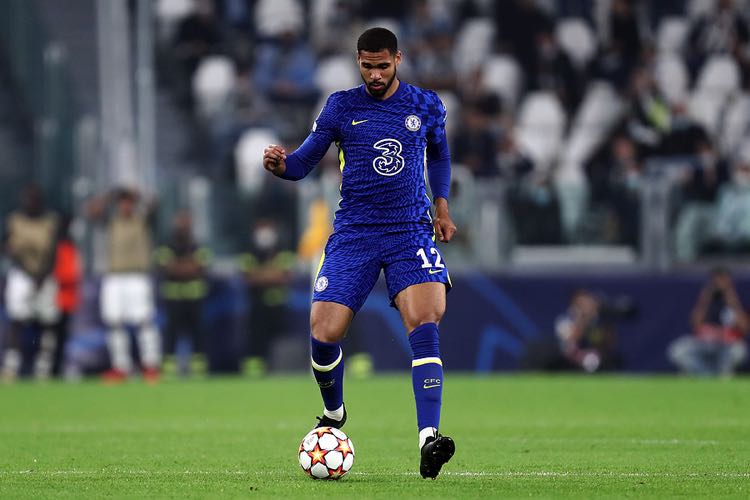Over the years, the Blues have had some iconic shirt sponsors, with the most prominent of these coming in the club’s golden era of the 2000s and 2010s. Although, they have also had their fair share of fairly rubbish sponsors too (but we won’t bring up Peter Foster just yet). When it comes to famous Chelsea sponsors, Samsung immediately stands out from the rest, with the South Korean electronics company appearing on the west London side’s shirts over a period of 10 highly successful seasons. During this period, Chelsea’s team was populated by some of the best players in the world, including Blues legends, such as Didier Drogba, Frank Lampard and John Terry.
We have compiled a list of sponsors below and will then look at each of them in more detail. We’ll also assess their “iconic rating”, and we’ll pick out the most legendary player to have each logo emblazoned on their chest.
Shirt Sponsors
| Shirt Sponsor | Year |
|---|---|
| Gulf Air | 1984-1985 |
| Simod | 1986-1987 |
| Commodore | 1987-1994 |
| Amiga* | 1993-1994 |
| Coors | 1994-1997 |
| Autoglass | 1997-2001 |
| Fly Emirates | 2001-2005 |
| Samsung | 2004-2015 |
| Yokohama Tyres | 2015-2020 |
| Three | 2020-2022 |
*Amiga is a brand of computers created by Commodore, so their inclusion on the shirt was part of the same deal.
Gulf Air
- Years: 1984-1985
- Legendary Player: Kerry Dixon
- Iconic Rating out of 10: 5
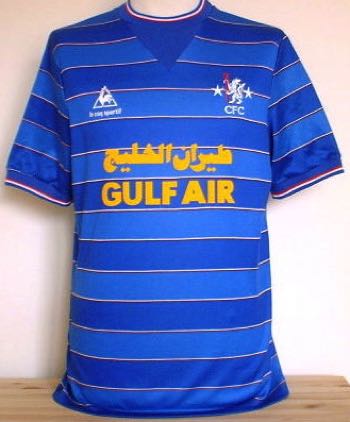 Chelsea’s first-ever shirt sponsor, Gulf Air, appeared in the latter stages of the 1983-84 campaign and was only worn by the club for a period of five months. Gulf Air is the state-owned airline of Bahrain, although it was originally a multinational airline, having been part of a consortium that also included Oman, the UAE and Qatar; it is now solely based in and owned by Bahrain.
Chelsea’s first-ever shirt sponsor, Gulf Air, appeared in the latter stages of the 1983-84 campaign and was only worn by the club for a period of five months. Gulf Air is the state-owned airline of Bahrain, although it was originally a multinational airline, having been part of a consortium that also included Oman, the UAE and Qatar; it is now solely based in and owned by Bahrain.
This short-term sponsorship, which reportedly cost the airline £150,000, was actually a very successful one, as the Blues managed to win the Second Division title, securing promotion back to the First Division. The west London giants were spearheaded by the excellent goalscoring form of Kerry Dixon, who scored an impressive 28 league goals. Whilst Gulf Air have likely faded from the memory of most football fans, they will always have a place in Chelsea’s history.
Whilst perhaps not worthy of paragraphs in their own right, Chelsea then briefly flirted with two other sponsors in the next season, before settling on Simod. First up, we have Grange Farm, an enterprise owned by Chelsea owner Ken Bates, which made ice cream and yoghurts on a 300-acre estate in the Home Counties. However, this sponsor lasted just a few matches. Next came the hugely controversial Bai Lin Tea. Supposedly a slimming tea, created by famous career criminal Peter Foster, who described himself as an “international man of mischief”. Any ideas why this product didn’t last very long on the front of Chelsea shirts? Because the claims about its slimming properties were found to be somewhat exaggerated (to put it kindly)!
Simod
- Years: 1986-1987
- Legendary Player: Pat Nevin
- Iconic Rating out of 10: 4
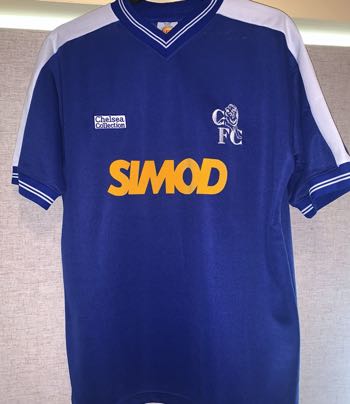 After Bai Lin Tea was safely thrown in the bin, Italian sportswear brand Simod, another one-season-wonder for the Blues, stepped into the fold. The company, which has suffered an enormous decline in popularity in recent years, were at their peak in the 80s and served as Chelsea’s sponsor for the 86/87 campaign. Whilst Gulf Air at least have the advantage of being associated with some sort of triumph, Simod’s only season as Chelsea sponsor saw the Blues finish 14th in the First Division, with no sort of cup run to speak of.
After Bai Lin Tea was safely thrown in the bin, Italian sportswear brand Simod, another one-season-wonder for the Blues, stepped into the fold. The company, which has suffered an enormous decline in popularity in recent years, were at their peak in the 80s and served as Chelsea’s sponsor for the 86/87 campaign. Whilst Gulf Air at least have the advantage of being associated with some sort of triumph, Simod’s only season as Chelsea sponsor saw the Blues finish 14th in the First Division, with no sort of cup run to speak of.
Commodore
- Years: 1987-1993
- Legendary Player: Dennis Wise
- Iconic Rating out of 10: 7
 Arguably the London club’s first “proper” shirt sponsor, Commodore International was an American computer and electronics company that was instrumental in the development of the home computer industry throughout the 70s, 80s and early 90s. In its heyday, Commodore was one of the largest personal computer manufacturers in the world, but their popularity declined in the 90s, and they went bankrupt in 1994.
Arguably the London club’s first “proper” shirt sponsor, Commodore International was an American computer and electronics company that was instrumental in the development of the home computer industry throughout the 70s, 80s and early 90s. In its heyday, Commodore was one of the largest personal computer manufacturers in the world, but their popularity declined in the 90s, and they went bankrupt in 1994.
Their original deal with Chelsea, agreed in 1987, cost a reported £1.25m for an initial three years, which was a British record at the time. However, in their first season as Chelsea sponsors, the Blues suffered disaster as they were relegated to the Second Division. Luckily for the west London giants, they were able to immediately return to the First Division the season after, where they have remained ever since. Some of the kits produced in this period were nothing short of stunning, and that definitely assists Commodore in the iconic rating category.
Amiga
- Years: 1993-1994
- Legendary Player: Glenn Hoddle (player-manager)
- Iconic Rating out of 10: 5
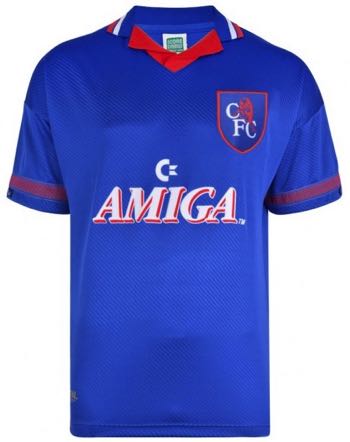 Similar to Arsenal’s Dreamcast-sponsored shirts as part of their deal with SEGA, Chelsea’s final year with Commodore saw the inclusion of their “Amiga” brand on the front of their shirts. Amiga was a family of computers first created by Commodore in 1985 that proved popular throughout the 80s and early 90s, selling an estimated 4.85 million units. However, in 1994, the electronics company released the Amiga CD32, which was a video game console version of the Amiga, and this spelled disaster for the company.
Similar to Arsenal’s Dreamcast-sponsored shirts as part of their deal with SEGA, Chelsea’s final year with Commodore saw the inclusion of their “Amiga” brand on the front of their shirts. Amiga was a family of computers first created by Commodore in 1985 that proved popular throughout the 80s and early 90s, selling an estimated 4.85 million units. However, in 1994, the electronics company released the Amiga CD32, which was a video game console version of the Amiga, and this spelled disaster for the company.
The CD32 failed dramatically in the market, causing Commodore to go bankrupt in April 1994. This was just two weeks before Chelsea were due to play in the FA Cup final, which they proceeded to lose 4-0 to Manchester United! This bankruptcy of course ended the west London club’s sponsorship deal with the computer brand, who have since faded from memory. Oh well, at least they are immortalised on some beautiful retro shirts.
Coors
- Years: 1994-1997
- Legendary Player: Ruud Gullit(player-manager)
- Iconic Rating out of 10: 8
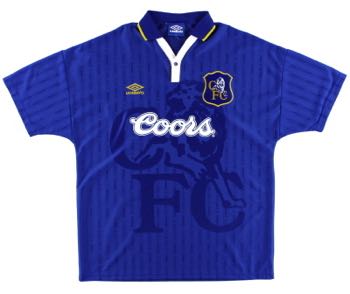 American beer giants, Coors, took over from Commodore as Chelsea’s shirt sponsor in 1994 and formed a fairly successful partnership with the club, which culminated in them winning the 1996/97 FA Cup. After Glenn Hoddle left west London to take on the England job, legendary Dutch midfielder/forward/defender/all-round cool bloke Ruud Gullit stepped in as player-manager. The 1987 ballon d’or winner became the first overseas manager to win the FA Cup, and in doing so, he also ended the Blues’ 26-year trophy drought.
American beer giants, Coors, took over from Commodore as Chelsea’s shirt sponsor in 1994 and formed a fairly successful partnership with the club, which culminated in them winning the 1996/97 FA Cup. After Glenn Hoddle left west London to take on the England job, legendary Dutch midfielder/forward/defender/all-round cool bloke Ruud Gullit stepped in as player-manager. The 1987 ballon d’or winner became the first overseas manager to win the FA Cup, and in doing so, he also ended the Blues’ 26-year trophy drought.
This set the tone for the success that Chelsea would go on to enjoy in the late 1990s and 2000s. Whilst the beer company only sponsored the club for a period of three seasons, this partnership saw the creation of one of the most divisive, marmite-esque shirts of all time – their grey/orange (or graphite/tangerine, if you prefer) away shirt. Whilst a lovely kit, it does look like something your grandad would wear. Umbro did produce some beauties in this period too; they really were on top form in the 1990s/early 2000s.
Autoglass
- Years: 1997-2001
- Legendary Player: Gianfranco Zola
- Iconic Rating out of 10: 8
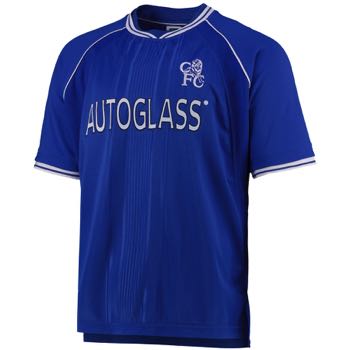 Windscreen replacement company Autoglass replaced Coors as Chelsea sponsor in 1997 (sorry for that) and forged another successful partnership with the Blues, who won two FA Cups, a League Cup, the UEFA Super Cup, and a UEFA Cup Winners’ Cup in this period.
Windscreen replacement company Autoglass replaced Coors as Chelsea sponsor in 1997 (sorry for that) and forged another successful partnership with the Blues, who won two FA Cups, a League Cup, the UEFA Super Cup, and a UEFA Cup Winners’ Cup in this period.
Whilst they still had a few years to wait to lift the Premier League trophy, the Blues were beginning to assert themselves as one of the top teams in the country. Their squad was now populated by several top-class players, including the iconic Gianfranco Zola, as well as the rock-solid centre-back duo of Marcel Desailly and Frank LeBeouf. The kits in this period, particularly the Umbro home shirts, were some of Chelsea’s finest ever; it wasn’t just Zola producing stunners in this period!
Fly Emirates
- Years: 2001-2005
- Legendary Player: Frank Lampard
- Iconic Rating out of 10: 9
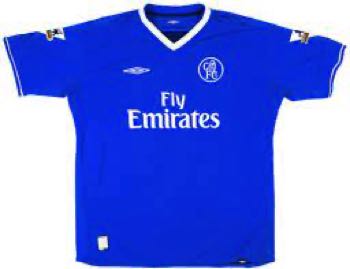 Whilst Emirates have since become heavily entwined with a different London club, their first foray into Premier League sponsorship was actually with Chelsea. The Blues’ four-year deal with the airline, beginning in the 2001/02 season, was the second-biggest sponsorship deal in British football history, worth a reported £24 million.
Whilst Emirates have since become heavily entwined with a different London club, their first foray into Premier League sponsorship was actually with Chelsea. The Blues’ four-year deal with the airline, beginning in the 2001/02 season, was the second-biggest sponsorship deal in British football history, worth a reported £24 million.
For the west London club, this was when things started to take off, as this period ended with them lifting their first league title in 50 years in 2004/05. They were led by a certain Jose Mourinho, who was fast becoming an icon of the game, and famously won the Premier League having only conceded 15 goals all season. Furthermore, Roman Abramovich’s takeover of Chelsea in 2003 led to rapid investment into the first-team squad, setting the club up for unprecedented success. Umbro continued their top form in the kit department, with the 2004/05 away kit being particularly lovely; this was an iconic period for the club.
Samsung
- Years: 2005-2015
- Legendary Player: Didier Drogba
- Iconic Rating out of 10: 10
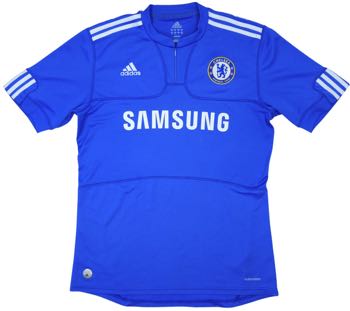 Easily Chelsea’s most iconic shirt sponsor, the South Korean electronics company oversaw a decade of almost constant success for the Blues. Chelsea won three Premier Leagues in this period, alongside their infamous Champions League success in 2011/12 and numerous domestic cups. The club was initially sponsored by the mobile phone division of Samsung, Samsung Mobile, but the “mobile” part was dropped from the shirts for the 2008/09 season.
Easily Chelsea’s most iconic shirt sponsor, the South Korean electronics company oversaw a decade of almost constant success for the Blues. Chelsea won three Premier Leagues in this period, alongside their infamous Champions League success in 2011/12 and numerous domestic cups. The club was initially sponsored by the mobile phone division of Samsung, Samsung Mobile, but the “mobile” part was dropped from the shirts for the 2008/09 season.
This sponsorship reportedly cost Samsung £18 million a year and coincided with the greatest period in Chelsea’s history. It was difficult to pick just one legendary player from this period, considering the number of Chelsea legends to choose from: Didier Drogba, Michael Essien, John Terry, Petr Cech… the list goes on!
Whilst the kits from this period were nice, and Adidas definitely produced a few beauties, they never quite reached the heady heights of the Umbro shirts of the Commodore or Emirates days. This was more than made up for by the on-field success, however!
Yokohama Tyres
- Years: 2015-2020
- Legendary Player: Eden Hazard
- Iconic Rating out of 10: 8
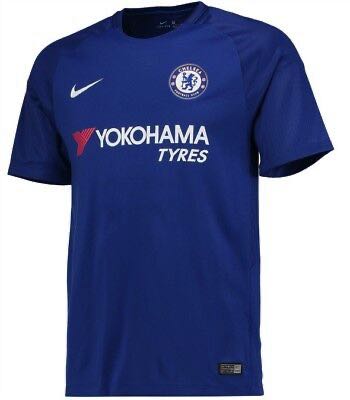 Japanese tyre company, Yokohama Tyres, stepped into the Samsung-shaped hole that emerged in 2015, as other Premier League teams had begun securing sponsors willing to pay a lot more than the South Korean conglomerate, and the Blues were keen to catch up. The five-year deal signed between the tyre giants and Chelsea was worth a reported £200 million, which was the second most valuable sponsorship in the Premier League at the time, behind Man United’s deal with Chevrolet.
Japanese tyre company, Yokohama Tyres, stepped into the Samsung-shaped hole that emerged in 2015, as other Premier League teams had begun securing sponsors willing to pay a lot more than the South Korean conglomerate, and the Blues were keen to catch up. The five-year deal signed between the tyre giants and Chelsea was worth a reported £200 million, which was the second most valuable sponsorship in the Premier League at the time, behind Man United’s deal with Chevrolet.
This period saw the Blues once again win the Premier League in 2016/17, now under the leadership of Antonio Conte; they were also able to win the Europa League in the 2018/19 campaign. Whilst not at such as furious pace as when Samsung was written across their chests, the Blues continued to be successful, and their team remained populated by world-class players, such as Eden Hazard and Diego Costa. However, after attempting and failing to agree on a new deal with Yokohama in 2020, the club instead began to look elsewhere for an even more lucrative sponsor, which ended up being Three.
Three
- Years: 2020-2022
- Legendary Player: Kai Havertz
- Iconic Rating out of 10: 8.5/10
 Whilst the exact figure isn’t available to the public, we can assume that it must have been fairly eye-watering for Three to outdo the £40 million a year deal that the Blues had previously had with Yokohama tyres. To sweeten the deal, the British telecommunications company also agreed to ensure that Stamford Bridge would be 5G-enabled, as the lack of mobile phone signal at football stadiums is an ongoing annoyance of the modern supporter.
Whilst the exact figure isn’t available to the public, we can assume that it must have been fairly eye-watering for Three to outdo the £40 million a year deal that the Blues had previously had with Yokohama tyres. To sweeten the deal, the British telecommunications company also agreed to ensure that Stamford Bridge would be 5G-enabled, as the lack of mobile phone signal at football stadiums is an ongoing annoyance of the modern supporter.
With the customary large “3” written on their chests, the Blues were immediately off to a flyer, winning the 2020/21 Champions League, thanks to a late winner from Kai Havertz. They have also lifted both the UEFA Super Cup and the Club World Cup in this period. Furthermore, the Nike kits produced in this period have also been pretty solid, with the 2022/23 third kit being particularly clean and sharp, depending on your personal opinion anyway!

